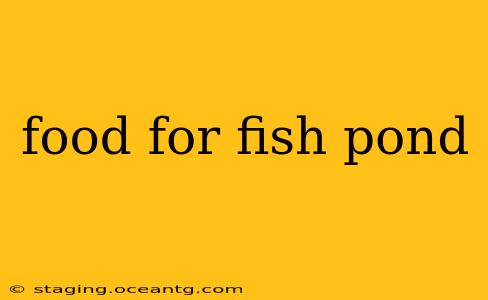Maintaining a thriving fish pond requires more than just clean water and the right environment. Feeding your fish the right food is crucial for their health, growth, and overall well-being. This comprehensive guide will delve into the various options available, helping you choose the perfect diet for your pond inhabitants. We'll explore different food types, feeding schedules, and considerations to ensure your fish flourish.
What Kind of Fish Food Should I Use?
The best fish food for your pond depends heavily on the species of fish you're keeping. Different fish have different nutritional needs. Generally, you can choose from several categories:
-
Commercial Fish Pellets: These are widely available and come in various sizes and formulations, catering to different fish sizes and species. Look for pellets specifically designed for pond fish, as they often contain a balanced mix of proteins, carbohydrates, and essential nutrients. Pay attention to the protein content; higher protein is generally better for growth, but avoid excessively high levels as this can lead to water quality issues.
-
Live Food: This includes things like bloodworms, daphnia, and mosquito larvae. Live food is a great source of natural nutrition and can be particularly beneficial for young fish or those recovering from illness. However, sourcing and managing live food can be time-consuming and potentially introduce diseases to your pond.
-
Natural Foods: Supplemental feeding with natural foods like duckweed, algae, and other aquatic plants can provide a balanced diet and contribute to a healthy pond ecosystem. These can also serve as a source of shelter and breeding grounds. However, these alone are unlikely to provide all the necessary nutrients for many fish species.
-
Homemade Fish Food: While possible, creating a balanced homemade diet is challenging. It requires careful consideration of nutrient ratios, and getting it wrong can lead to malnutrition. Unless you have extensive knowledge of fish nutrition, it's generally best to stick to commercially available options.
How Often Should I Feed My Pond Fish?
Overfeeding is a common mistake that can lead to poor water quality and fish health problems. A good rule of thumb is to feed your fish only what they can consume in a few minutes. This typically translates to:
- Spring and Summer: Feed daily, or every other day, during warmer months when fish are more active and require more energy.
- Autumn and Winter: Reduce feeding frequency in colder months, as fish metabolism slows down. You may only need to feed them a few times a week or even less, depending on the temperature.
Always observe your fish. If food remains uneaten after a few minutes, you're likely overfeeding.
What Happens If I Overfeed My Pond Fish?
Overfeeding has serious consequences:
- Poor Water Quality: Uneaten food decays, causing a build-up of ammonia and other harmful substances in the water.
- Fish Diseases: Poor water quality creates a breeding ground for bacteria and parasites, increasing the risk of fish disease.
- Algal Blooms: Excess nutrients in the water can fuel algal blooms, which can deplete oxygen levels and further harm your fish.
What is the Best Fish Food for Koi?
Koi are large, relatively hardy fish that benefit from a diet that includes:
- High-quality Koi pellets: These pellets are specifically formulated to meet the nutritional needs of koi, often containing a higher protein content than general pond fish food. Look for pellets that are slow-sinking to encourage them to feed at different water depths.
- Supplemental foods: Occasionally supplementing with fresh vegetables (like lettuce or peas, blanched first) or some live food can be beneficial. Always introduce new food types gradually.
What Type of Food is Best for Goldfish in a Pond?
Goldfish, like koi, benefit from a diet of high-quality pellets designed specifically for goldfish or pond fish. Remember to choose a pellet size appropriate for their size.
Can I Feed My Pond Fish Bread?
While fish may initially eat bread, it lacks essential nutrients and can be harmful in the long run. It's generally not recommended as a regular food source and should be avoided entirely.
Are There Any Fish Food Alternatives?
Besides commercial and live food, supplementary feeding with natural foods like algae and certain aquatic plants, if available in your pond, can certainly provide additional nutrients. However, these should always supplement, not replace, a proper commercial fish food diet.
By following these guidelines and choosing the right food for your pond fish, you'll be well on your way to creating a healthy and thriving aquatic environment. Remember to always observe your fish and adjust their feeding schedule as needed. A healthy and balanced diet is key to happy and healthy pond fish!
